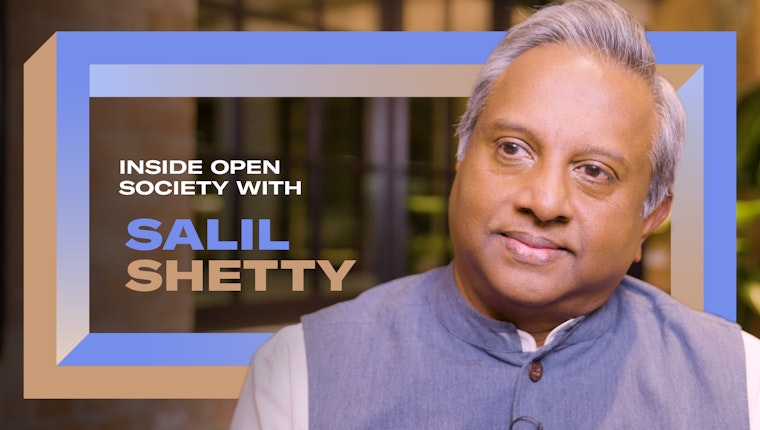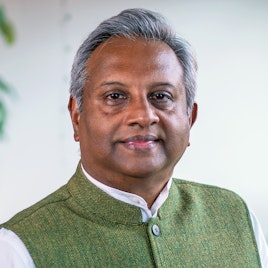Why I Fight for Democracy
By Salil Shetty

Inside Open Society is a look at the leaders at the Open Society Foundations who are advancing our vision to address the world’s most urgent threats to democracy and human rights at a transformative scale.
The extent to which a society is free is noticeable to a young child in their home. I was born in India at a time when open society was under severe threat. I went to school in the 1970s, when civil and political rights were suspended entirely in India for the first time in the nation’s history through a political emergency declared by then-Prime Minister Indira Gandhi.
My father was a journalist and my mother was a women's rights lawyer. I grew up in a situation where everybody I knew was in jail. I got involved in student politics. I knew what it meant to be attacked for your basic fundamental rights. Being on the receiving end of anti-democratic powers got me interested in what makes a society open or closed. And while I did not have the academic language at that stage to describe it as such, I could tell from a young age the importance of fighting for justice, fairness, and equality.
What I learned most throughout my childhood and my young adult life working in Kenya was that the ability to speak one’s mind and live one’s life freely can never be taken for granted.
My parents brought their fight against the curtailing of basic freedoms into our home. What I learned most throughout my childhood and my young adult life working in Kenya was that the ability to speak one’s mind and live one’s life freely can never be taken for granted.
Authoritarians, using their power to terrorize, spread hate and divide societies by scapegoating particular groups. They tell children seeking safety in new countries and new communities that they are not welcome. They dictate to women and people able to have children whether, when, if, and how many children they can have or whether they can access contraception. They declare LGBTQ+ families unworthy. They make known to families whether their religion is acceptable. If you're a Muslim in some non-Islamic countries today, you may not be able to find a place to rent or a job, all because of an identifiably Muslim name. They silence dissent and snuff out independent media.
This is the erosion of democracy. And more countries than ever are suffering from this erosion, with the capture and hollowing out of public institutions like parliaments and judiciaries rendering many democratic processes performative. Authoritarians continue to gain popular support in many of these places, where the vote has only the illusion of being free and fair. This is a pattern we are witnessing across the globe, from Hungary and India to Sri Lanka, to the Philippines.
But just as authoritarians follow a strict pattern in how they strong-arm their way into people’s homes and private lives, so too is there a pattern for breaking their influence. It starts in the home, at the community level. Slowly, incrementally, this is how change happens—and it’s often led by those on the margins.
That’s where Open Society is fighting to turn back the tide. Our grantees and partners are working to support movements that are challenging authoritarian power—from youth activists in Europe to feminist movements in Latin America. We’re supporting those at the national, regional, and international levels who are mobilizing new coalitions to stand up for democratic values. We are lifting up human rights defenders and organizations working to advance justice and democracy. We’re also working with governments to make them more responsive to society’s needs, from Zambia to Chile.
In country after country, we see that the fight for true democracy comes from the most marginalized groups—the lowest castes in South Asia, religious minorities, and of course, young people. These are the groups that are developing innovative approaches to civic and political activism in defense of democratic participation and to amplify demands for democracies to renew and deliver for the people they serve.
Open society means a place in which people have fundamental freedoms: the freedom to express themselves, the freedom to move, the freedom to assemble. For me, democracy, open society, and human rights intersect—and together they form the concept of justice and fairness.
The Open Society Foundations are unique because of their scale and ability to take risks. Through investments, litigation, and philanthropy, we continue to help to build movements that will shift the tide to renew democracy. Authoritarians create fear, which makes people shy away from taking them on. But Open Society has never hesitated to do what needs to be done to fight these kinds of anti-democratic forces—and we will support the movements and the next generation to do so.

Until September 2023, Salil Shetty was vice president, global, at the Open Society Foundations.


